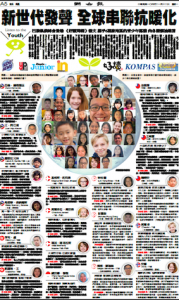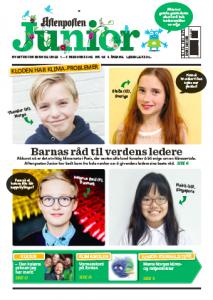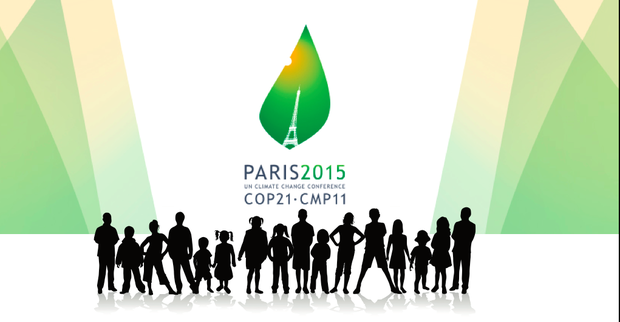VietnamPlus won a digital first prize last year for presenting the news in rap style. Editor in chief Le Quoc Minh has continued that musical approach by creating a song in observance of COP21. "Many young people in Vietnam have no idea about [climate change] though we have published many stories," he said. "That’s why I make it more entertaining."
Hear it, in English, here:
https://www.youtube.com/watch?v=YqD90k-69Ew&feature=youtu.be
Also, as any editor of a World Young Reader Prize-winning youth edition can tell you, children ask clear questions and give straight answers. That was the case again when champion editors from six countries asked children what they would advise the leaders meeting in Paris for COP21. In short: No politics just action.
Gina Lin, editor of The Student Weekly  Taiwan's Student Weekly edition of the United Daily News.(Taiwan, United Daily News) organized the project, which also included six other past winners of a WAN-IFRA World Young Reader Prize: Kids' News (Denmark), The Straits Times (Singapore), Junior Enquirer (Philippines), Aftenposten Junior (Norway), South China Morning Post (Hong Kong) and Kompas (Indonesia).
Taiwan's Student Weekly edition of the United Daily News.(Taiwan, United Daily News) organized the project, which also included six other past winners of a WAN-IFRA World Young Reader Prize: Kids' News (Denmark), The Straits Times (Singapore), Junior Enquirer (Philippines), Aftenposten Junior (Norway), South China Morning Post (Hong Kong) and Kompas (Indonesia).
"I was really touched when I saw these lovely faces of children around the world from the photos everyone sent to us," Lin said.
Here is what some of the other partners did:
- SCMP young post: http://bit.ly/1NCTHvZ
- Kids' News: video for Facebook
https://www.facebook.com/kidsnewsdk/videos/993176057394929/
- UDN Student Weekly: special version on the UDN Focus App
(1)main articles http://a.udn.com/focus/2015/11/30/15355/index.html (2)showing layouts from partners http://a.udn.com/focus/2015/12/13/15685/index.html
Some examples of the replies:
I want to request that you try implementing Meatless Mondays in schools wherein each student will not consume meat for one day in a week. You can conserve water this way. I read somewhere that it takes 12,000 liters of water just to produce a kilogram of beef compared to 850 liters of water to produce a kilogram of wheat.
--Juan Iñigo, 10, Philippines for Junior Inquirer
 Aftenposten Junior of NorwayPeople spend too much time making up new iPhones. None of us will care about phones when we die of pollution. The leaders in all countries should rather encourage scientist to try to make up things that are useful for the environment. I want a kind of vacuum cleaner that can get rid of polluted air. I also think it should be cheaper to use public transport, because no one wants to use the bus if it costs a lot of money. Then they’d rather use the car.
Aftenposten Junior of NorwayPeople spend too much time making up new iPhones. None of us will care about phones when we die of pollution. The leaders in all countries should rather encourage scientist to try to make up things that are useful for the environment. I want a kind of vacuum cleaner that can get rid of polluted air. I also think it should be cheaper to use public transport, because no one wants to use the bus if it costs a lot of money. Then they’d rather use the car.
-- Theodore, 11, Norway for Aftenposten Junior
We think you are already doing a good job. Please keep an open mind to the ideas of other people, however small or crazy they might seem on how to reduce global warming. I hope you will most especially consider ideas from us kids, especially because we will be inheriting the Earth.
-- Jakob, 11, Philippines, Junior Inquirer (Philippines Daily Inquirer)
Over dinner the other night, I spoke to my mother about this topic, and she said that “I would understand when I get older”, and that I “couldn’t expect anything to be perfect, anyway”. I don’t see how growing up would justify indifference, or an acceptance of things clearly problematic – do we not all have a responsibility to change things for the better? Age cannot simply an excuse for apathy. We cannot ignore these problems.
-- Catherine, 16, Hong, for Young Post (South China Morning Post)
Not long ago, my mother showed me a picture on the internet. It was a polar bear standing on an Arctic floe. What once was supposed to be a chubby polar bear now becaem skiny and bony due to lack of food...I hope that presidents from countries all around the world can take a look at this picture and try to put their feet into the shoes of these aninmals to feel their pain.
-- Ian, 8, Taipei City for Student Weekly (United Daily News)
They were also asked about what they do now in their own lives to help:
”I have to remember to turn off the light and not to be in the shower for longer than I need to. In that way I do not use a lot of water that I do not need. We should all be better at recycling. We also need to remember that we do not have to buy new things if the old things still work.”
-- Magnus, 9, Denmark for Kids' News (Berlingske Media)
"I live close to the tube and I’ll use public transport instead of the car. The small choices you make in everyday life are the important ones – I recycle garbage and I don’t throw away food. If somebody in the future can make a plane that uses solar panel instead of fuel, I’ll want to use that plane."
-- Theodore, 11, Norway for Aftenposten Junior
"If something I own is broken, I’ll try to mend it instead of throwing it away. And if I see garbage in the street, I’ll pick it up. I also inherit clothes and buy used clothes on the internet. I think that’s a good idea. Then less clothes can be produced and that’ll be a good thing for the environment."
-- Anna, 11, Norway for Aftenposten Junior
"I can be more productive during the day to save electricity at night. Many students stay up late at night to do unproductive activities like playing computer games. When I reduce these activities, I not only lead a lower carbon lifestyle but I also have more time to sleep."
-- Nicholas, 16, Singapore for The Straits Times



